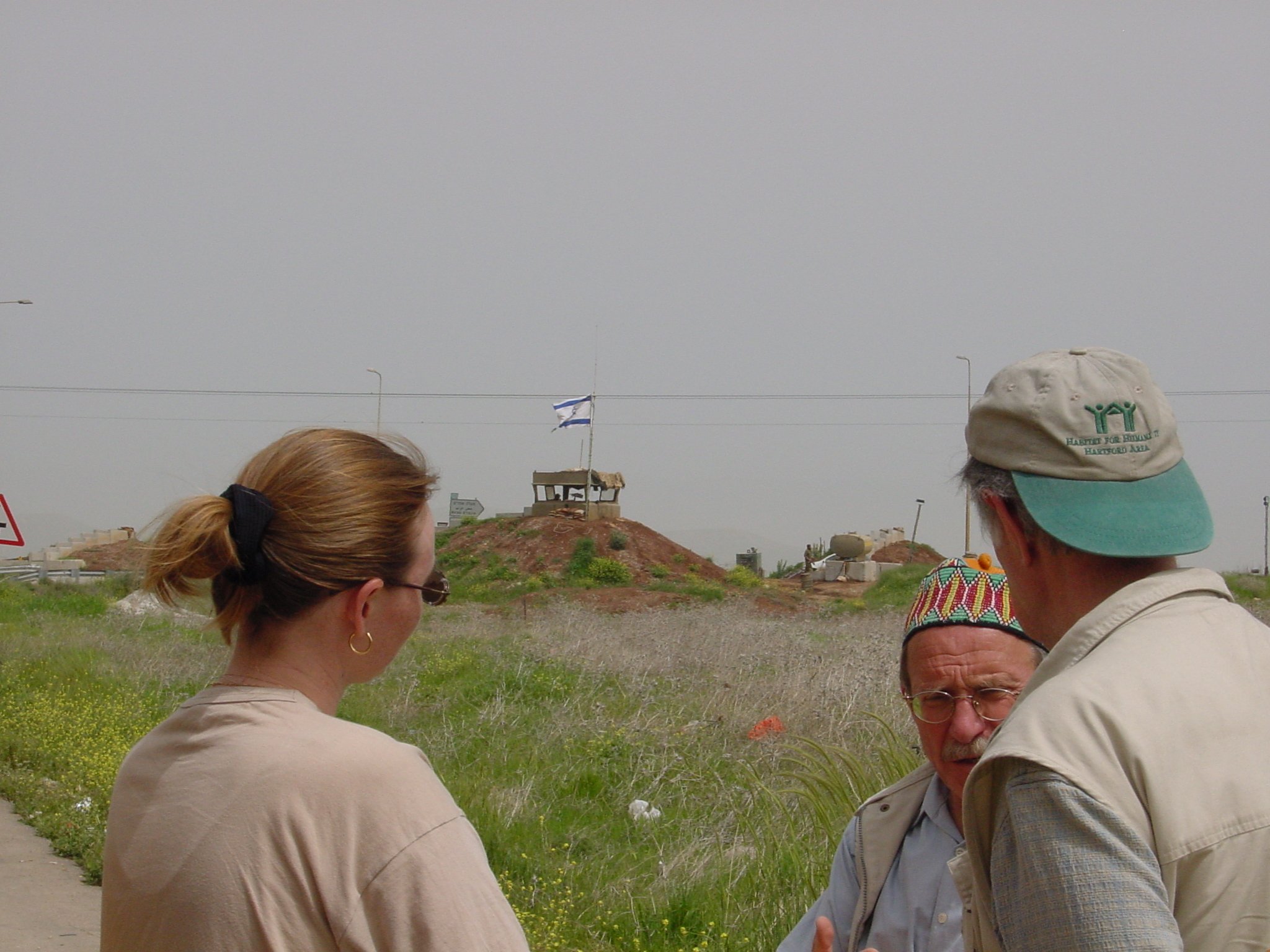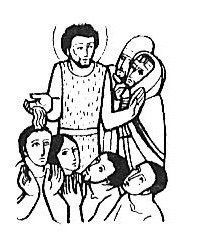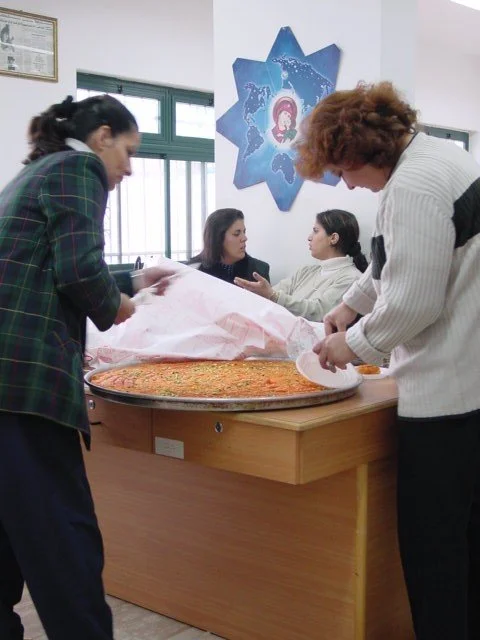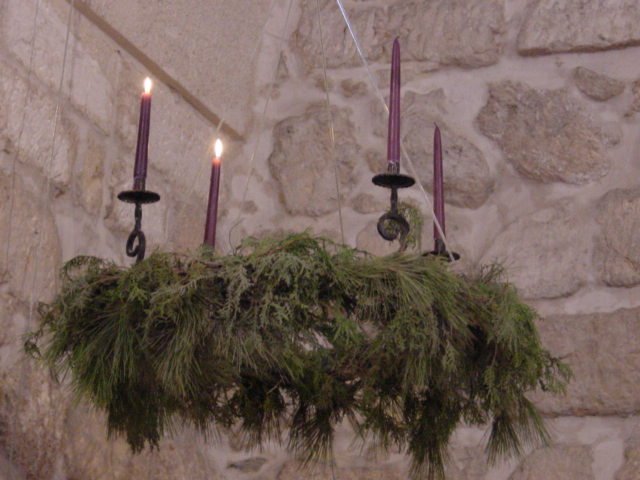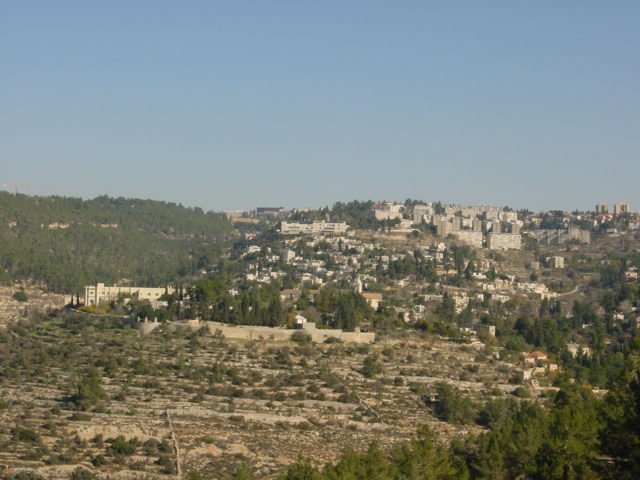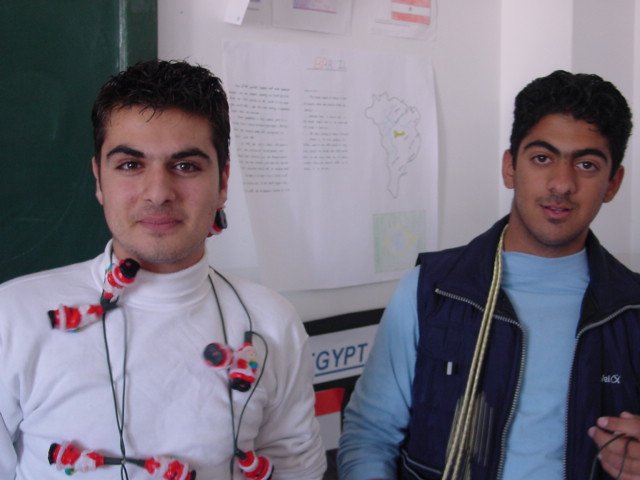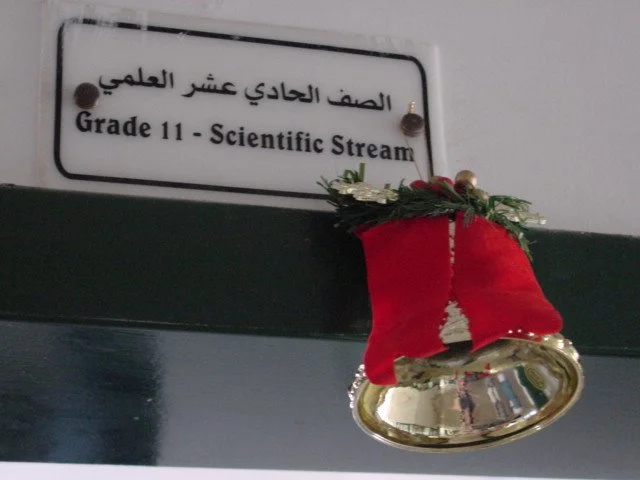December, 2002
First light came soon, as did the Nigerians' singing. The Germans were celebrating communion, and the Bedouins were still hawking their blankets - a remarkable cacophony. Sunrise, the last sunrise of 2002, came at 6:30, a brilliant red peeking over the horizon.
One of the two reasons we came to this area is the Convent of St. Catherine's. Since the third century, small monastic communities settled on and around the holy Mount Sinai, fleeing Roman persecution and revering the site of the burning bush and the delivery of the ten commandments.
We walked from the center of town to our hotel, spread-out stone bungalows perfectly camouflaged in the shadow of impressive mountains that surrounded the slowly tilting plain.
It was then that the contrast really struck us - the brown, seemingly lifeless, dry desert peaks above, and the colorful, breath-taking scene teeming with life below.
The "holiday village" where we are staying is pleasant enough, standing off by itself. Clusters of rectangular stone huts topped by whitewashed domes, like Motel 6's version of Cairo's City of the Dead.
The conversation was pervaded with questions of whether to stay in Israel, who was already gone, where to get gas masks, whether to get inoculations. The looming war with Iraq has serious consequences for people in Israel, as Saddam Hussein - if attacked - would probably try to attack Israel, as he did in the first Gulf War.
There is an important distinction between understanding a point of view and agreeing with it.
In the words of Fr. Aktham's Christmas message, "In the midst of a war zone, we send to you our greetings in the name of the Prince of Peace." Merry Christmas.
Palestinians are not allowed to travel from Ben Gurion anymore. And it takes three hours to deliver this definitive news, apparently.
Since 9:00 that morning, soldiers had stopped all movement along the road. Perhaps two hundred students who had tried to make their way from Zababdeh up to take their exams were stopped by the soldiers, not allowed to go to the University or back home. Most young men had their IDs taken as they waited. After a couple hours, the women and the professors were told they could go, but they decided to stay, both as a sign of solidarity and because they feared what might happen to the male students if they left.
Fr. Thomas was keen to point out that those children who came represented quite the "icon" of the body of Christ: Orthodox, Catholic, Melkite, and Anglican children all came.
Part way into the service, the electricity cut out - frustrations with the local grid continue - so Marthame and Homam preached by candlelight.
Palestinians often say, "We are not living - we are like animals, surviving." Today, Marthame felt that sentiment in his bones.
One soldier helpfully offered that we could take the children in Fr. Aktham's car, or that one of us could drive the bus. Fr. Aktham protested the unreasonableness of this, which the ski-masked soldier answered with, "Do you think I care? I don't care! He can wait five more hours for all I care!" as he waved his M-16 around.
This afternoon, Marthame came home with a bag and a big, long box: Fr. Aktham gave us a tree and ornaments as a Christmas present!
One of the casualties of the last two years has been Palestinian hospitality - famous for its generosity, it has not had many opportunities to extend itself over the last two years.
Fr. Aktham preached on the text of John the Baptist, Ein Kerem's native son, crying in the wilderness. This is our call, he told the congregation, our evangelism, to be the Christian voice in this land.
It has been seventeen years since Fr. Stephen, the last Melkite priest, died, and now Stephen's son was able to witness the ordination of his oldest son. A proud moment too long in coming.
The close-knit nature of society here, with mostly small towns and strong family allegiances keeps a kind of peace. We wonder at this, considering where we came from: what would happen in Chicago or Atlanta or even Lubbock if there were suddenly no police? It gives us the shudders, and gives us an appreciation for our host culture.
One person said they'd been told by an American Christian that working for reconciliation in Israel and Palestine is sinful, because it impedes God's progress toward Armageddon.
After deciding Abdallah wasn't returning, the Israeli soldiers rounded up the students. "We just want the Muslims. No Christians." We've heard about such deliberate dividing, but to hear about it first hand was somehow more disturbing. Tensions do exist between Christians and Muslims in Palestinian society, much like racial tensions exist in American society. Stoking those tensions seems much like an intentional divide and conquer policy.
As has become all too familiar, the Jenin bus arrived late - an hour late, to be exact. The road situation is never predictable, and today was no exception. On top of this, Tubas is a "closed military zone."
In Zababdeh today, leaders of the Christian community went to the home of Sheikh Fathi to greet the elders of the Muslim community. This has been a traditional practice in this part of the world, that people stop by to wish each other Kul 'am w-intum bi-kheir (may you be well all year). Muslims visit the priest at Christmas and Easter, Christians visit the sheikh at 'Eid il-Fitir and 'Eid al-'Adha.
Fr. Paul helped us locate the item Deacon Firas had been asking for: a wooden stamp used by the Eastern churches in the baking of eucharistic bread.
We noticed the proliferation of Hebrew signs announcing that "Jordan is the Palestinian state" and suggesting the transfer of "250,000 Arabs" as the solution to peace.
When bombings and clashes and invasions are ranked in the currency of lives lost, it is too easy to forget the "lucky" ones, perhaps like this man, who will also always bear the scars of the conflict.
At that point, Marthame chimed in - sometimes it helps to let the Israeli soldiers know that they're dealing not just with Palestinians, whom many view with disdain if not outright disgust (sometimes it has no impact) - "Is there a problem?"
The news of the ninety-five year-old woman shot and killed by Israeli troops as she tried to get in Ramallah by taxi is disturbing.
Over the past couple weeks, Elizabeth's eleventh graders wrote short skits in English, imagining a dream, fantasy, or nightmare of their homeroom teacher.
After lunch, we received visitors from American Near East Refugee Aid (ANERA). The school, in partnership with the Women's Studies Centre, has given them a proposal for a computer center, with special emphasis on women and girls' professional training.






